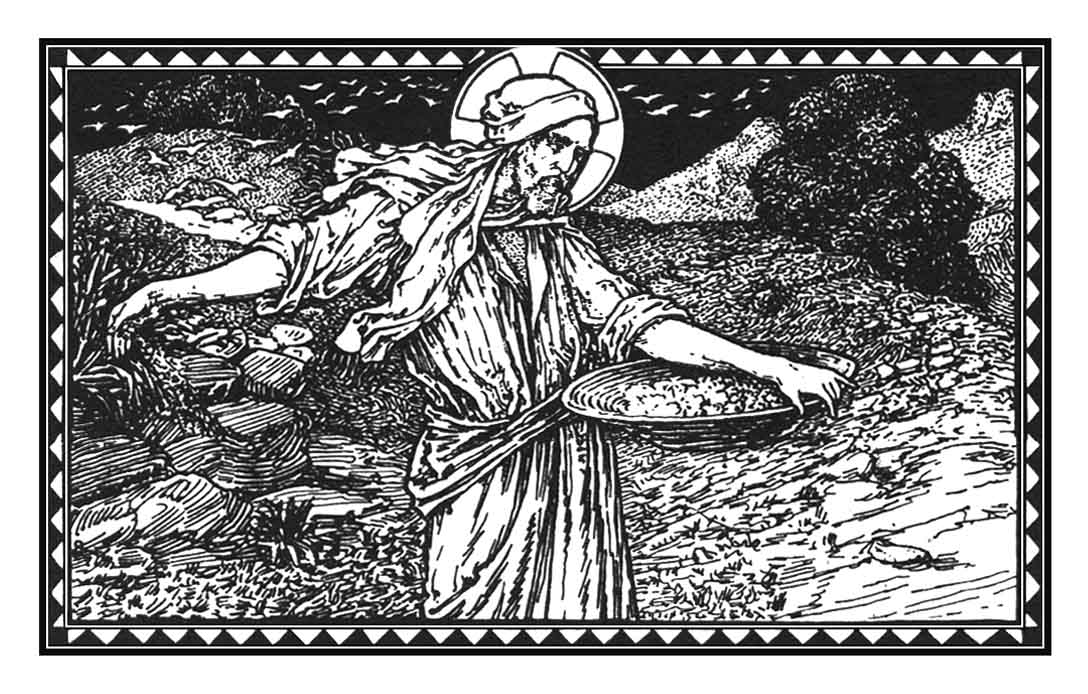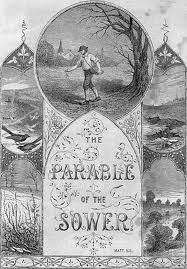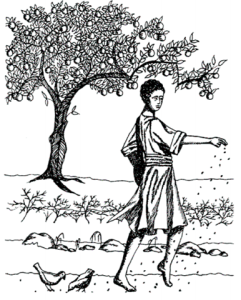Sexagesima Sunday is part of the preparatory period (from Septuagesima Sunday up to Ash Wednesday) that precedes the Season of Lent.
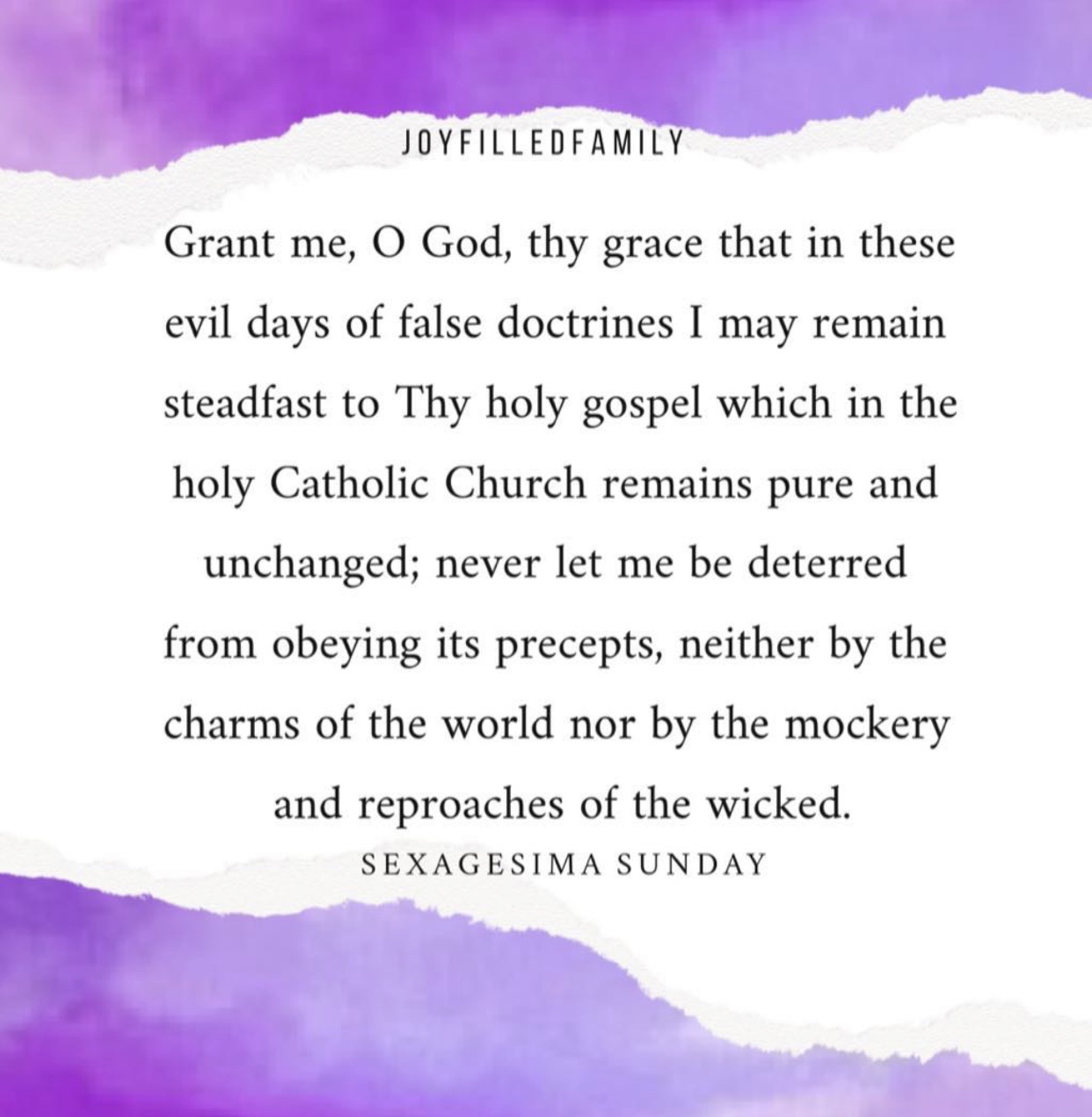
Learn more here or here.
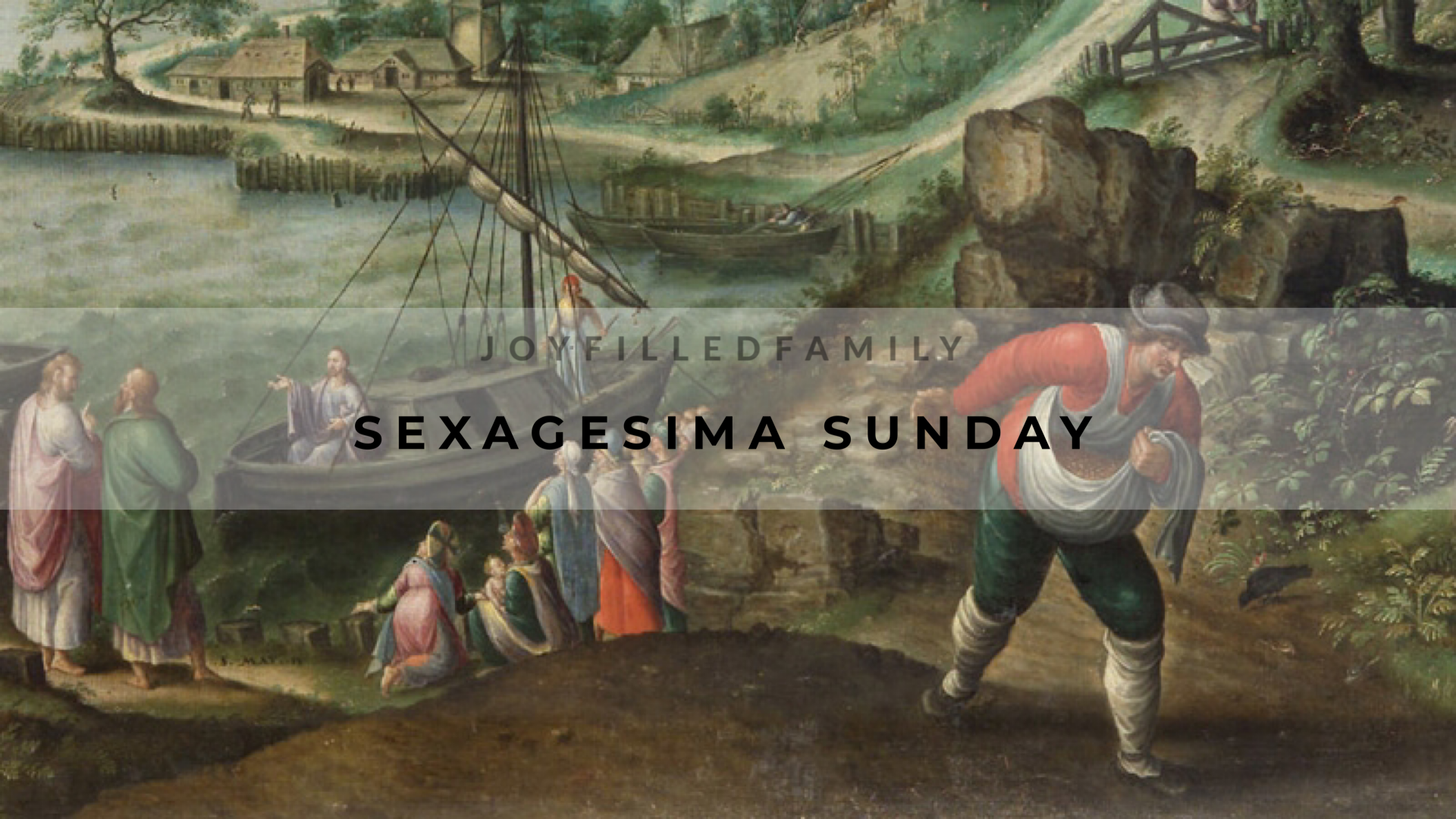
The Church’s Year
Fr. Goffine’s
In the INTROIT of this day’s Mass, the Church brings before us one who seeks to be loosed from his sins, and calls on God for help and assistance. Arise, why sleepest thou, O Lord? arise, and cast us not off to the end: why turnest thou thy face away, and forgettest our trouble? Our belly hath cleaved to the earth: arise, O Lord, help us and deliver us. O God, we have heard with our ears; our Fathers have declared to us. (Ps. 43:23, 25) Glory be to the Father, etc.
COLLECT O God, who seest that we trust not in aught we do; mercifully grant that by the protection of the Doctor of the Gentiles we may be defended against all adversities. Through our Lord Jesus Christ, etc.
EPISTLE (II Cor. 11:19-33; to 12:1-9) Brethren, you gladly suffer the foolish; whereas yourselves are wise. For you suffer if a man bring you into bondage, if a man devour you, if a man take from you, if a man be lifted up, if a man strike you on the face. I speak according to dishonor, as if we had been weak in this part.
Wherein if any man dare (I speak foolishly), I dare also. Are they Hebrews? so am I. Are they Israelites? so am I. Are they the seed of Abraham? so am I. Are they the ministers of Christ (I speak as one less wise,) I am more: in many more labors, in prisons more frequently, in stripes above measure, in deaths often.
Of the Jews five times did I receive forty stripes save one. Thrice was I beaten with rods; once was I stoned; thrice I suffered shipwreck; a night and a day I was in the depth of the sea. In journeying often, in perils of waters, in perils of robbers, in perils from my own nation, in perils from the Gentiles, in perils in the city, in perils in the wilderness, in perils in the sea, in perils from false brethren. In labor and painfulness, in much watchings, in hunger and thirst, in fastings often, in cold and nakedness; besides those things which are without, my daily instance, the solicitude for all the Churches.
Who is weak, and I am not weak? Who is scandalized, and I am not on fire? If I must needs glory, I will glory of the things that concern my infirmity. The God and Father of our Lord Jesus Christ, who is blessed forever, knoweth that I lie not. At Damascus the governor of the nation under Aretas the king, guarded the city of the Damascenes to apprehend me; and through a window in a basket was I let down by the wall, and so escaped his hands. If I must glory (it is not expedient indeed); but I will come to the visions and revelations of the Lord. I know a man in Christ above fourteen years ago, (whether in, the body I know not, or out of the body, I know not, God knoweth): such an one rapt even to the third heaven. And I know such a man (whether in the body or out of the body, I cannot tell, God knoweth): that he was caught up into paradise; and heard secret words, which it is not granted to man to utter. For such an one I will glory; but for myself I will glory nothing, but in my infirmities. For though I should have a mind to glory, I shall not be foolish; for I will say the truth.
But I forbear, lest any man should think of me above that which he seeth in me, or anything he heareth from me. And lest the greatness of the revelations should exalt me, there was given me a sting of my flesh, an angel of Satan, to buffet me. For, which thing thrice I besought the Lord, that it might depart from me. And he said to me: My grace is sufficient for thee; for power is made perfect in infirmity. Gladly therefore will I glory in my infirmities, that the power of Christ may dwell in me.
Why is St. Paul mentioned in the Mass of this day, and why is this epistle read?
Because in Rome the Station or Church service is held on this day in the Church of St. Paul and because the Church continues to encourage us to work according to the example given by St. Paul who, with the grace of God, accomplished and suffered so much; also because we should labor for the honor of God and the salvation of our souls and faithfully cooperate with the grace of God.
Why, at the beginning of this epistle, does St. Paul say so much on his own praise?
Not out of ambition for honor and glory, but to honor God, and for the love and advantage of the Corinthians, who allowed themselves to be deceived by mercenary impostors and false prophets; that he might make public the craftiness of those deceivers who assumed the appearance of the true apostles, as Satan took the form of a good angel. To shame these, and to remove the obstacles they had placed in the way of the gospel, St. Paul was obliged to reveal to the Corinthians the things he had performed and endured in propagating the holy gospel.
By trials and sufferings is the true apostle known; the false apostles, the hirelings, as Christ calls them, only care for their own bodies, for temporal advantages, not for the salvation of souls. We see this exemplified in our days by the heretical missionaries who, when there is suffering, when there is martyrdom, take to flight, for their eyes are directed only to the present life and a large income, while the Catholic missionaries rejoice if, for Christ’s sake, and for the salvation of souls, they are permitted to suffer, and made worthy to endure the cruel death of the martyr.
Of whom does St. Paul relate such marvels?
Of himself, but from humility and modesty he does not say so; fourteen years before, forty-four years after the birth of Christ, St. Paul was rapt to the third heaven, that is, to the abode of happy spirits; but to preserve him in humility God permitted Satan to use the concupiscence of the flesh, which is like a sting in the body of man, as a temptation to the apostle, and by which he was continually tormented.
ASPIRATION Grant me, O God, Thy grace that in these evil days of false doctrines I may remain steadfast to Thy holy gospel which in the holy Catholic Church remains pure and unchanged; never let me be deterred from obeying its precepts, neither by the charms of the world nor by the mockery and reproaches of the wicked.
GOSPEL (Luke 8:4-15) At that time, when very great multitude was gathered together and hastened out of the cities unto him, he spoke by a similitude: The sower went out to sow his seed. And as he sowed, some fell by the wayside; and it was trodden down, and the fowls of the air devoured it. And other some fell upon a rock; and as soon as it was sprung up, it withered away, because it had no moisture. And other some fell among thorns; and the thorns growing up with it, choked it. And other some fell upon good ground; and being sprung up, yielded fruit a hundredfold.
Saying these things, he cried out: He that hath ears to hear, let him hear. And his disciples asked him what this parable might be. To whom he said: To you it is given to know the mystery of the kingdom of God, but to the rest in parables; that seeing, they may not see, and hearing, they may not understand.
Now the parable is this: The seed is the word of God. And they by the way-side are they that hear: then the devil cometh, and taketh the word out of their heart, lest believing they should be saved. Now they upon the rock are they who, when they hear, receive the word with joy; and these have no roots, for they believe for a while, and in time of temptation they fall away. And that which fell among thorns are they who have heard, and going their way, are choked with the cares and riches and pleasures of this life, and yield no fruit. But that on the good ground are they who, in a good and perfect heart, hearing the word, keep it, and bring forth fruit in patience.
Why is the Word of God compared to a seed?
Because from the word of God germinates the fruit of good works, as from good seed grows good fruit; as it is impossible, therefore, for an unsowed field to produce good fruit, so is it impossible for man without the seed of God’s word to produce good fruits of the spirit.
Why does Christ cry out in the parable: He that hath ears to hear, let him hear?
Because of the importance and necessity of the doctrine which was contained in the parable. For to hear the word of God is absolutely necessary for salvation, as the Apostle indicates: How shall they believe him (Jesus) of whom they have not heard? (Rom. 10:14) Jesus calls those happy who hear the word of God and keep it. (Luke 11:28) And on this subject St. Augustine says:
Be assured, my brethren, that as the body becomes weakened by want and hunger, and wastes to a mere shadow, so the soul that is not nourished by the word of God, becomes shrunken, worthless and unfit for any good work.”
Whence comes so much cockle of evil, when the seed of God’s word is so abundantly sowed?
Because, as Christ says, the seed falls now by the wayside, now upon a rock, now among thorns, seldom upon good soil, that is to say, those who hear the word of God are as a highway, over which many distracting thoughts are traveling which tread down the scattered seed, or, like fowls of the air devour it; they are like rocks, hardened by their prejudices or repeated crimes, so that the divine word cannot take root; again, they are so overgrown by the thorns of worldly cares, the constant desire for wealth and riches, and sensual delights, that even if they receive the seed, it is unable to grow and bear fruit.
On the power of God’s Word
The word of God is compared, by the Prophet Jeremias, to a hammer which crushes hearts as hard as rocks, and to a fire that dries up the swamps of vice, and consumes inveterate evil habits. (Jer. 23:29)
The Psalmist compares it to thunder that makes all tremble, a storm-wind that bends and breaks the cedars of Lebanon, that is, proud and obstinate spirits; a light that dispels the darkness of ignorance; and a remedy that cures sin. (Ps. 28:3, 5; 118, 105)
St. Paul compares it to a sword that divides the body from the soul, that is, the carnal desires from the spirit; (Hebr. 4:12) the Apostle James to a mirror in which man sees his stains and his wrongs. (Jam. 1:23) the Prophet Isaias to a precious rain that moistens the soil of the soul and fertilizes it; (Isai: 60:10, 11) and Jesus Himself compares it to a seed that when it falls on good ground, brings forth fruit a hundredfold. (Luke 8:8)
One single grain of this divine seed produced the most marvelous fruits of sanctity in St. Augustine, St. Anthony the Great, in St. Nicholas of Tolentino, and others; for St. Augustine was converted by the words: “Let us walk honestly as in the day: not in rioting and drunkenness, not in chambering and impurities, not in contention and envy.” (Rom. 8:13) St. Anthony by the words: “If thou wilt be perfect, go, sell what thou hast, and give to the poor, and thou shalt have treasure in heaven; and come, follow me.” (Matt 19:21) Nicholas of Tolentino was brought to Christian perfection by the words: “Love not the world, nor the things which are in the world.” (I John 2:15)
How should we prepare ourselves to be benefited by the word of God?
We must be good, well-tilled soil, that is, we must have a heart that loves truth, desires to learn, and humbly and sincerely seeks salvation; we must listen to the word of God with due preparation and attention, keep the divine truths we have heard, in our heart, frequently consider and strive to fulfil them.
What should be done before the sermon?
We should endeavor to purify our conscience, for, as St. Chrysostom demands; “Who would pour precious juice into a vessel that is not clean, without first washing it?” We should, therefore, at least cleanse our hearts by an ardent sorrow for our sins, because the spirit of truth enters not into the sinful soul; (Wisd. 1:4) we should ask the Holy Ghost for the necessary enlightenment, for little or no fruit can be obtained from a sermon if it is not united with prayer; we should listen to the sermon with a good motive; that is, with a view of hearing something edifying and instructive; if we attend only through curiosity, the desire to hear something new, to criticize the preacher, or to see and to be seen, we are like the Pharisees who for such and similar motives went to hear Christ and derived no benefit therefrom. “As a straight sword goes not into a crooked sheath, so the word of God enters not into a heart that is filled with improper motives.”
We should strive to direct, our minds rightly, that is, to dispel all temporal thoughts, all needless distraction, otherwise the wholesome words would fall but upon the ears, would not penetrate the heart, and the words of Christ be fulfilled: They have ears, and hear not.
How should we comfort ourselves during the sermon?
We should listen to the sermon with earnest, reverent attention, for God speaks to us through His priests, and Christ says to them: Who hears you, hears me. (Luke 10:16) We must listen to the priests, therefore, not as to men, but as to God’s ambassadors, for every priest can say with St. Paul: We are ambassadors for Christ, God, as it were, exhorting by us. (II Cor. 5:20) “If,” says St. Chrysostom, “when the letter of a king is read, the greatest quiet and attention prevails, that nothing may be lost, how much more should we listen with reverence and perfect silence to the word of God?”
The word of God is, and ever will be, a divine seed, which, when properly received, produces precious fruit, by what priest soever sowed; for in the sowing it matters not what priest sows, but what soil is sowed. Be careful, also, that you do not apply that which is said to others, but take it to yourself, or the sermon will be of no benefit to you. Are you free from those vices which the preacher decries and against which he battles? then, thank God, but do not despise others who are perhaps laboring under them, rather pray that they may be released and you preserved from falling into them. Keep also. from sleeping, talking, and other distractions, and remember, that whoever is of God, also willingly hears his word. (John 8:47)
What should be done after the sermon?
We should then strive to put into practice the good we have heard, for God justifies not those who hear the law, but those who keep it, (Rom. 2:13) and those who hear the word of God and do not conform their lives to it, are like the man who looks into the mirror, and having looked into it goes away, and presently forgets what manner of man he is. (Fam. 1:23, 24) To practice that which has been heard, it is above all necessary that it should be kept constantly in mind, and thoughtfully considered. St. Bernard says:
Preserve the word of God as you would meat for your body, for it is a life-giving bread, and the food of your soul. Happy those, says Christ, who keep it. Receive it, therefore, into your soul’s interior, and let it reach your morals and your actions.”
That food which cannot be digested, or is at once thrown out, is useless; the food should be well masticated, retained, and by the digestive powers worked up into good blood. So not only on the day, but often during the week, that which was heard in the sermon should be thought of and put into practice. Speak of it to others, thus will much idle talk be saved, many souls with the grace of God roused to good, and enlightened in regard to the evil they had not before seen in themselves and in future will avoid. Let us listen to others when they repeat what was said in the sermon. Heads of families should require their children and domestics to relate what they have heard preached. Let us also entreat God to give us grace that we may be enabled to practice the precepts given us.
PRAYER How much am I shamed, O my God, that the seed of Thy Divine word, which Thou hast sowed so often and so abundantly in my heart, has brought forth so little fruit! Ah! have mercy on me, and so change my heart, that it may become good soil, in which Thy word may take root, grow without hindrance, and finally bring forth fruits of salvation. Amen.
